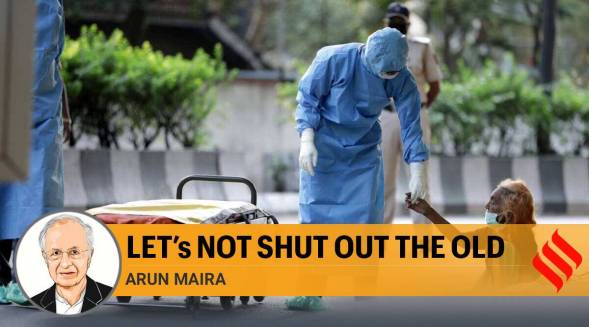
By Arun Maira, Chair of the HelpAge International Board of Trustees
The most vulnerable persons during the COVID pandemic are the elderly. If infected, their odds of survival are the lowest. When shut away to save them from infection, they are likely to suffer from neglect – from lack of care for other ailments, and loneliness. The pandemic has highlighted humanity’s dilemma of what to do with older people.
Globally, the population aged 65 and over is growing faster than other age groups. Life spans are increasing with better healthcare, nutrition, and sanitation. In 2018, for the first time in history, people aged 65 or above outnumbered children. Children are our future, no doubt. However, the changing shape of populations threatens to bankrupt economies. How will fewer young people provide for the care of larger numbers of older persons if the latter no longer contribute to communities?
When the president of Zanzibar received me as the Chairman of HelpAge International in 2017, he posed his dilemma to me. The rights of older people are enshrined in Zanzibar’s constitution. It directs the government to set aside money to maintain a good home for older people. He wanted me to see the well-equipped home the government ran. The problem was it was under-used because older people would rather stay with their families.
Later, the minister for social development and the president of the Older Persons’ Association explained the President’s dilemma. Both of them were grandparents who enjoyed being with their grandchildren, and their families also liked having them around. Grandparents kept an eye on the house and the children when the parents went to work. The arrangement was good for the economy, and for society too, they felt.
I asked what help they wanted from HelpAge International. The minister asked could we convince international aid agencies that their solution was the best one for older people in Zanzibar, and not keep driving the government to set aside more money for facilities to put away older people?
“No place like home” is the heading of the Economist’s account of what the pandemic has revealed. Across the rich world, nearly half of all deaths from COVID-19 have happened in care and nursing homes, even though less than 1 percent of people live in them. Countries with fewer care homes have had fewer COVID-19 deaths, all else being equal.
Older people want to add more life to their years, not more years to their life. As well as exposing fragile business models, the pandemic has highlighted the tension between keeping old people safe and keeping them well. “People should be the boss of their own lives. It is better to live in a house than a warehouse,” says Bill Thomas, the American geriatrician who founded the Green House movement for the care of older persons.
All things must be considered before prescribing strong medicines. Indeed, this is why we are so careful about testing new medicines for COVID-19 before releasing them for public use. The pandemic has revealed many factors that contribute to human well-being Lockdowns – a strong medicine to prevent COVID-19 deaths – have harmed human well-being in many ways, by other medical problems that could not be attended to and even by starvation in poorer countries due to disruptions of the economy. In India, as elsewhere, attention is focused every day on counting the deaths caused by COVID-19. The other tragedies, though not counted, are visible in heart-rending images of migrants struggling to find work, and people denied healthcare for other diseases.
What we have learned from the pandemic is that local systems solutions, developed and implemented by communities, are necessary to solve complex problems. Communities understand their needs and their capabilities better than experts, who are distant from them. Collaboration on the ground has enabled many communities to prevent the spread of the pandemic, as well as taken care of other needs of their members. In India, Kerala, with its systems of local, collaborative action, seems to have done much better than other states. Internationally, countries with strong local systems have done better.
Vietnam seems to have survived the pandemic better than most countries. One reason is the strength of the OPA (Older Persons’ Associations) movement which the government has supported for many years. OPAs operate in all districts of the country. They are adding younger members and transforming themselves into Inter-Generational Self-Help Groups. They take responsibility for the most vulnerable people in their communities – most of whom are older people. They also work with local officials to improve local services and infrastructure for the benefit of the whole community. They are “nodes” in networks of actors who know what is required and who can working together, improve services for everyone. The older members of these groups are proving to be valuable assets for the community. Moreover, because they are active and they feel valued, they add more good life to their remaining years.
Older people have an invaluable role to play in our collective future. We must keep older people engaged, not shut them out to protect their bodies from the virus. Unfortunately, the generic medicine of “physical distancing” to fight the pandemic has been branded as “social distancing”. We need “social cohesion”, not “social distancing” in communities, and in humanity as a whole, to fight this pandemic and also improve human well-being.


